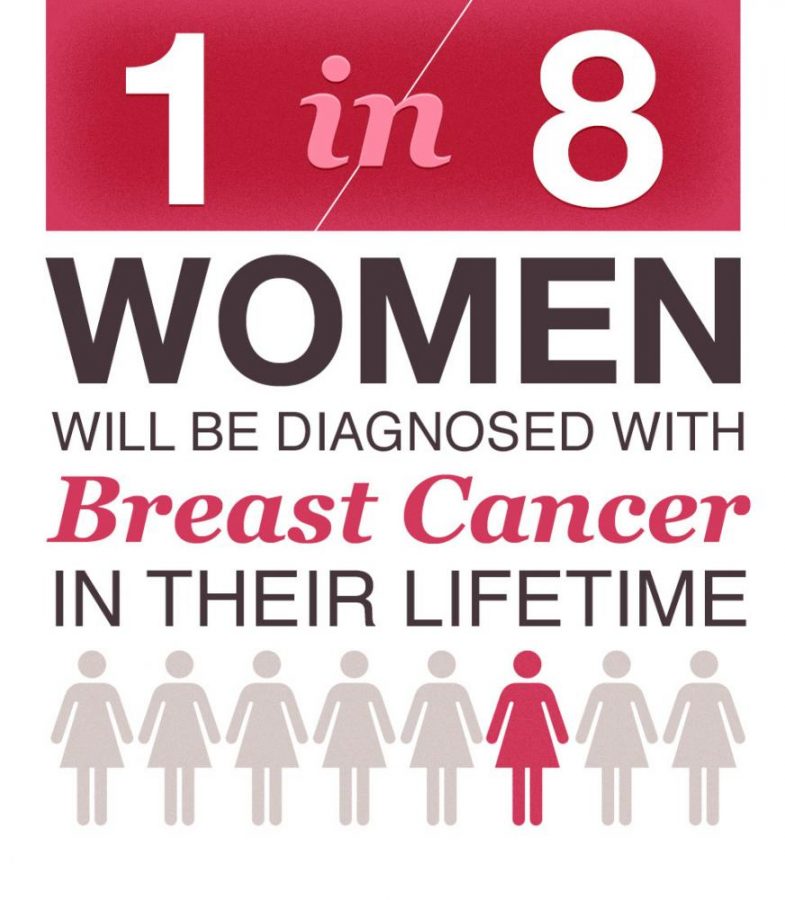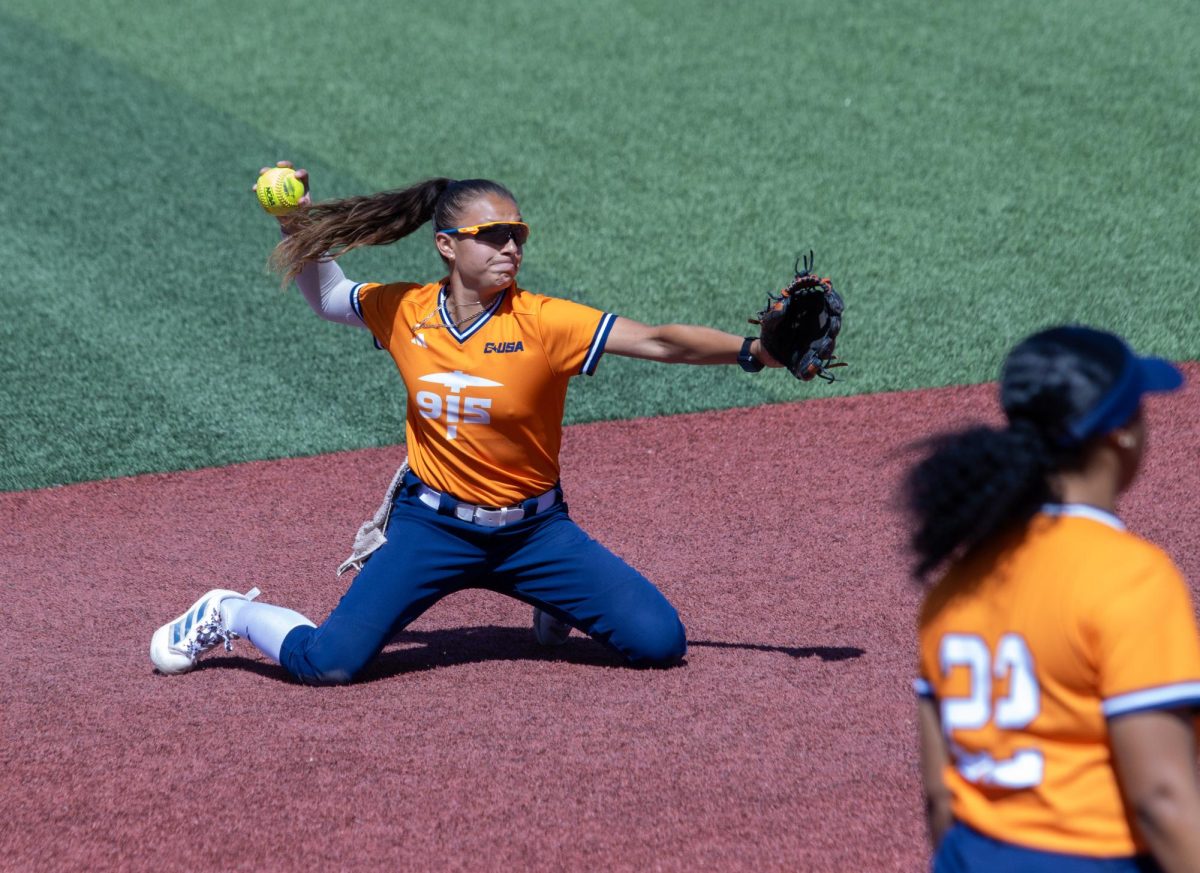Every October turns pink as different local, national and international charities join the annual breast cancer awareness campaign to raise money for cancer research and offer support to those who are or have been affected by breast cancer.
Breast cancer starts when the cells grow out of control, often forming a tumor that can be seen through an x-ray or be felt as a lump. It is more common in women, but men can get it too.
“When I discovered the little lump, it wasn’t on my breast, it was more on the side of my ribs,” said Maria Magdalena Rubalcava, 53-year-old breast cancer survivor. “Within weeks the little lump became larger and moved to the lower portion of my right breast, that was when I decided to go to the doctor, and after a mammography and a biopsy, they told me it was cancer.”
The Zeta Tau Alpha sorority on campus focuses on different activities throughout the month of October to educate others, promote awareness and do fundraising for breast cancer patients such as Rubalcava.
“We want to educate our women, our UTEP students and anyone else who is willing to listen,” said Andrea Luna, senior organizational and corporate communication major and director of philanthropy. “Each semester we try to hold a workshop provided by our nationals and our national partnerships, where it gives a basic rundown of what signs and symptoms to look for and how to perform a breast exam.”
Luna said she found her passion in volunteering for breast cancer awareness from the significant statistics of people who are affected.
“Since 1992, Zeta Tau Alpha has been actively creating awareness for breast cancer through breast health tip cards, self-examination stickers and pink ribbons to create awareness,” Luna said “Our various partnerships with BrightPink, NFL and Making Strides Against Breast Cancer have allowed us to do more than pass out ribbons. We’ve had the opportunity to interact with survivors and learn their stories, the struggles of their families and how they have had to cope with this illness in their lives and their loved ones.”
According to the American Cancer Society, breast cancer is more common among women, with one in eight diagnosed.
An early diagnosis and early treatment are the most important strategies, as this can prevent deaths and the cancer is easier to treat successfully.
“I was in my 30s when I was diagnosed and even though I was young, it is a very tough process,” Rubalcava said. “After the biopsy, I had surgery and they placed a catheter in my chest, then they started the chemotherapy. For my second session I started to lose my hair.”
Breast cancer can be treated in different ways. Some of the treatments can be given orally or through the bloodstream, depending on the type of cancer and the type of treatments.
Chemotherapy, hormone therapy, target therapy and even alternative treatments such as herbs and special diets can be used to treat breast cancer. Most women receive more than one type of treatment for their cancer.
“I had four to five sessions of chemotherapy in a year, and after that they checked the size of the tumor, it got smaller so the doctors decided it was better to remove it,” Rubalcava said. “They said they would try to save my breast, but it was better if they removed it, so they did.”
A mastectomy consists of the removal of breast tissue and possibly the removal of tissue surrounding the breast area.
“After a couple of months, the doctors found another lump, this time in my left breast, I didn’t want it to get more advanced, so I decided to remove my left breast too,” Rubalcava said.
There are different types of procedures when it comes to the removal of breast tissue. A total (simple) mastectomy for example consists of the removal of the entire breast including the nipple, and in some cases both breasts are entirely removed as a preventative measure in women who are at high risk for breast cancer.
Another procedure is the radical mastectomy, which is the removal of the entire breast, underarm lymph nodes and chest wall muscles under the breast. This procedure is mostly used for large growing tumors under the breast.
“After they removed my breast, I had a couple more sessions of chemotherapy and it was hard for me because my family didn’t seem to care that much, I had to go through it alone with my children,” Rubalcava said. “I remember my youngest son at the time was scared, especially when I didn’t go to pick him up after school because he was afraid of me not being there anymore.”
The positive attitude that is necessary when coping with this disease was crucial for Rubalcava, who found her strength in religion.
“God is where I found my strength, my family wasn’t there, but I had friends and support from other people that got me through it,” she said. “My children and God made me fight.”
Ruvalcaba said that after she was diagnosed with breast cancer, she stopped helping the different organizations that claim to support cancer patients.
“I went to different organizations here in El Paso and none of them granted me the help I needed,” Rubalcava said. “They told me that because my husband made enough money, they couldn’t help me. One time they told me that if I wanted the help I had to sign in the forms that I was divorced in order to get the help.”
The expenses for cancer treatments are high, some starting as little as $100 per month, to as much as $65,000 per month, depending on the type of medication. But there are also unforeseeable expenses, as Rubalcava discovered.
“My insurance paid most of my treatment, but these organizations, who claim to help patients, didn’t even help me to get me a wig or a mastectomy bra,” Rubalcava said. “A wig can cost up to $70 and a bra up to $85 for just one bra, and the clothing is expensive too.”
Cancer changes the life of person, not only physically, but also psychologically, she said.
“It affects your self esteem in so many ways, I felt embarrassed of not being able to wear my old clothes, sometimes I thought to myself ‘ I’m fine, I got through it,’ but it stills affects me,” Rubalcava said. “I got breast implants, but I still get x-rays just to check everything is okay.”
Even though there is no sure way to prevent cancer, making some lifestyle changes such as being physically active, staying at a healthy weight and limiting the ingestion of alcohol can lower the risk of developing cancer.
To Zeta Tau Alpha, promoting awareness about breast cancer is a main focus during the month of October as this is a topic of importance for women to know about.
“We all chose to take part of this sorority because of how inspiring it is to see women empowering one another,” Luna said. “We’ve all fallen in love with our philanthropy because as women, we understand what a great risk this could be in our futures.”










